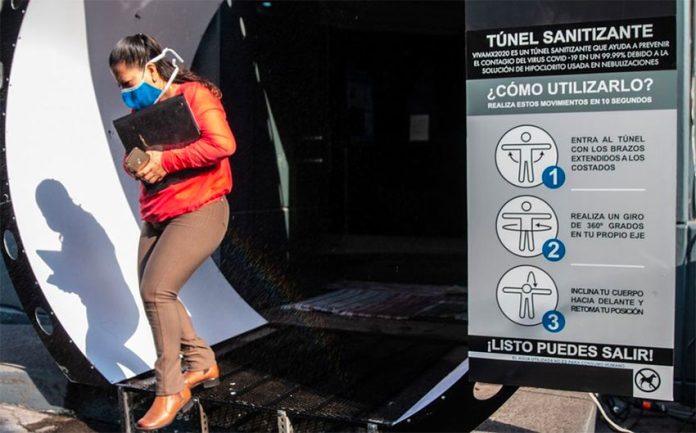Whereas some governments are heeding the advice of Mexico’s Ministry of Health and removing disinfection tunnels thought to help control the spread of coronavirus, others are moving ahead with their installation.
The automated tunnels, which spray people with ozone, are being removed across Mexico City at the behest of that city’s mayor, Claudia Sheinbaum. The decision comes on the heels of an April 8 warning that the tunnels are not only ineffective in preventing the spread of the virus, but may also aid in its transmission.
On April 8, the Health Ministry warned that “inhaling disinfectants can cause, among other things, damage to the airways, coughing, sneezing and irritation of the bronchi, triggering asthma attacks, producing chemical pneumonitis and irritation of the skin, eyes and mucosa,” the ministry stated.
A simple sneeze, according to the Deputy Health Minister Hugo López-Gatell, can propel the virus for a distance of up to 10 meters. “There are drops that are too heavy and fall two meters, there are drops that are light and fall six meters and there are drops that are lighter that fall 10 meters away, which can happen if I sneeze.”
“Those virus particles are going to be mobilized and if the sanitization time is not technically monitored, and that depends on the size of the person, the area to be covered and the intensity, … it will not be enough to inactivate the virus and would have the opposite effect,” López-Gatell cautioned.
But in Aguascalientes, the installation of 12 sanitization tunnels in markets, stores and public spaces is going forward, despite the federal warning. Octavio Jiménez Macías of that state’s Health Ministry assured that the installation of sanitation tunnels is common in cities across Mexico and the world, and is useful in flattening the coronavirus curve.
The product used as a component of the spray, he argued, is endorsed by the National Institute of Respiratory Diseases (INER), a hospital for the treatment and research of respiratory diseases which is also run by the Mexican government.
For his part, López-Gatell stands by the Health Ministry’s statement on the potential dangers tunnels pose. “If they didn’t represent a risk we wouldn’t have said anything,” he said, calling the tunnels “a waste of money.”
The tunnels first began to appear in Nuevo León at the end of March.
Source: Quadratin (sp), Lider Empresarial (sp), Milenio (sp), El Universal (sp)
